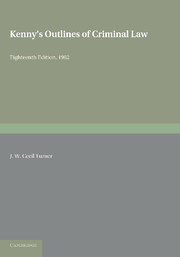Book contents
- Frontmatter
- Preface to the Sixteenth Edition
- Preface to The Seventeenth Edition
- Preface to the Eighteenth Edition
- Contents
- Index of cases
- Index to the principal statutes
- List of principal books cited
- BOOK I GENERAL CONSIDERATIONS
- BOOK II DEFINITIONS OF PARTICULAR CRIMES
- BOOK III MODES OF JUDICIAL PROOF
- BOOK IV CRIMINAL PROCEDURE
- CHAPTER XXIX LIMITATIONS ON CRIMINAL JURISDICTION
- CHAPTER XXX CRIMINAL COURTS
- CHAPTER XXXI SUMMARY PROCEDURE
- CHAPTER XXXII ORDINARY PROCEDURE
- CHAPTER XXXIII ORDINARY PROCEDURE
- CHAPTER XXXIV ORDINARY PROCEDURE
- Appendix I The meaning of ‘credit’
- Appendix II II Rules as to admission of evidence which reveals to the jury facts discreditable to the person accused
- Appendix III III Forms of indictment
- Index
CHAPTER XXXI - SUMMARY PROCEDURE
from BOOK IV - CRIMINAL PROCEDURE
Published online by Cambridge University Press: 05 June 2016
- Frontmatter
- Preface to the Sixteenth Edition
- Preface to The Seventeenth Edition
- Preface to the Eighteenth Edition
- Contents
- Index of cases
- Index to the principal statutes
- List of principal books cited
- BOOK I GENERAL CONSIDERATIONS
- BOOK II DEFINITIONS OF PARTICULAR CRIMES
- BOOK III MODES OF JUDICIAL PROOF
- BOOK IV CRIMINAL PROCEDURE
- CHAPTER XXIX LIMITATIONS ON CRIMINAL JURISDICTION
- CHAPTER XXX CRIMINAL COURTS
- CHAPTER XXXI SUMMARY PROCEDURE
- CHAPTER XXXII ORDINARY PROCEDURE
- CHAPTER XXXIII ORDINARY PROCEDURE
- CHAPTER XXXIV ORDINARY PROCEDURE
- Appendix I The meaning of ‘credit’
- Appendix II II Rules as to admission of evidence which reveals to the jury facts discreditable to the person accused
- Appendix III III Forms of indictment
- Index
Summary
Section I. Courts of Summary Jurisdiction
The summary jurisdiction of justices of the peace is the creation of statutes. Parliament has thus immeasurably extended the common law powers of justices, whilst at the same time reducing to a minimum their legal responsibility; and the steady tendency of modern legislation is towards giving enhanced importance to these courts of summary jurisdiction. It is advisable, therefore, to consider their procedure somewhat fully. It is regulated by the Magistrates' Courts Act, 1952, and references in this chapter are to that Act unless otherwise stated.
This summary jurisdiction is not exclusively criminal, but extends also to a few civil cases. It may in some matters be exercised (though even in them only to a limited extent) by a single justice; but in most it is necessary to have either two ordinary justices or a stipendiary magistrate or a metropolitan stipendiary magistrate. It is subjected to a limitation of time; for the proceedings must be begun within the six months following ‘the time when the offence was committed, or the matter of complaint arose’. And for its exercise a prescribed place of meeting is now made essential, in order to secure ready access for the public. Two kinds of place are recognized.
PLACE OF MEETING
The habitual place of meeting of the justices of the locality is their ‘petty-sessional court-house’ Two justices, by sitting here, constitute themselves a ‘magistrates' court’ and such a court alone can exercise the summary jurisdiction to the full, For a single justice, wherever sitting, can only hear certain classes of case; and in them he can pass only a sentence of imprisonment of not more than fourteen days, or a fine (including costs) of not more than twenty shillings.
In counties, even the area of a single petty sessional division may be so wide as to make it convenient to provide in it subsidiary places of meeting for use in case of emergency. Such a place is called an ‘occasional court-house’. When sitting in it, even a bench of two or more justices can inflict no greater sentence than that which a single justice could, though they are not limited to his range of cases.
- Type
- Chapter
- Information
- Kenny's Outlines of Criminal Law , pp. 548 - 559Publisher: Cambridge University PressPrint publication year: 2013



